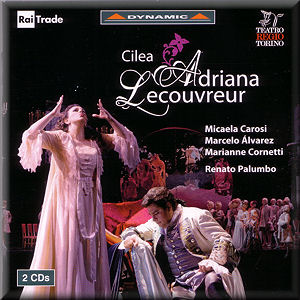 |
 |
|


alternatively
CD: MDT
AmazonUK
AmazonUS |
Francesco CILEA
(1866 - 1950)
Adriana Lecouvreur (1902)
 Micaela Carosi (soprano) - Adriana Lecouvreur; Marcelo Álvarez
(tenor) - Maurizio; Marianne Cornetti (mezzo) - La principessa di
Bouillon; Alfonso Antoniozzi (baritone) - Michonnet; Simone Del
Salvio (bass) - Il principe di BoLuca Casalin (tenor) - Abate; Antonella
De Chiara (mezzo) - Jouvenot; Patrizia Porzio (mezzo) - Dangeville;
Carlo Bosi (tenor) - Poisson; Diego Matamoros (bass) - Quinault;
Giuseppe Milano (bass) - Un maggiordomo
Micaela Carosi (soprano) - Adriana Lecouvreur; Marcelo Álvarez
(tenor) - Maurizio; Marianne Cornetti (mezzo) - La principessa di
Bouillon; Alfonso Antoniozzi (baritone) - Michonnet; Simone Del
Salvio (bass) - Il principe di BoLuca Casalin (tenor) - Abate; Antonella
De Chiara (mezzo) - Jouvenot; Patrizia Porzio (mezzo) - Dangeville;
Carlo Bosi (tenor) - Poisson; Diego Matamoros (bass) - Quinault;
Giuseppe Milano (bass) - Un maggiordomo
Orchestra and Chorus Teatro Regio Torino/Renato Palumbo
rec. live, Teatro Regio, Turin, Italy, 1, 5, 8 July 2009
Synopses in Italian, English, German and French
 DYNAMIC CDS 628/1-2 [75:23 + 66:21]
DYNAMIC CDS 628/1-2 [75:23 + 66:21] 
|
|
|
Eugène Scribe (1791-1861) must be one of the most popular
writers for the opera stage. He produced many librettos and
his plays were transformed into librettos by others. Auber,
Bellini, Boieldieu, Hálevy, Donizetti, Meyerbeer, Rossini
and Verdi all set his words. His play Adriana Lecouvreur
resulted in at least three other operas before Cilea wrote the
definitive version, the only one that has survived. Though less
frequently seen than Puccini’s, Mascagni’s and even
Giordano’s most successful creations, it is widely regarded
as Cilea’s masterwork. The premiere at Teatro Lirico in
Milan on 6 November 1902 was a great success and what else could
it be with the starry central trio Angelica Pandolfini, Enrico
Caruso and Giuseppe De Luca. All of them were still young: the
soprano had just turned 30, Caruso was only 29 and De Luca still
younger: 26. Caruso, by the way, recorded an excerpt from the
opera with the composer at the piano just a few days after the
premiere. When CBS, as it was then, nowadays Sony, recorded
Adriana Lecouvreur in the late 1970s they boasted a similarly
starry trio - actually amended by Elena Obraztsova singing La
principessa - Renata Scotto, Placido Domingo and Sherrill Milnes.
This has been my favourite since it was first released and every
newcomer has to compete with it - normally a losing battle.
The present issue doesn’t fare too well either, even though
there are some good things. Renato Palumbo is a good and experienced
conductor and his forces from Turin sing and play well. However,
set against James Levine, the Ambrosian Opera Chorus and the
Philharmonia they are ruled out - albeit not totally. The feel
of a true performance - recorded live across three evenings
and then edited together - gives the recording a sense of occasion.
That said, there is no doubt that Levine’s reading has
more ‘nerve’, more light and shade. The recording
is, as very often with Dynamic issues, excellent and the balance
mostly more than acceptable.
But when we come to the solo singing reservations begin to creep
in. Adriana requires a large voice - a Tebaldi of an instrument!
- and Micaela Carosi has the heft. It is a vibrant voice, but
I have heard many more unattractive attempts at this music.
The big aria in act I, Io son l’umile, is quite
well managed and she finds some lyricism in it. Beside an undeniable
glow. Poveri fiori is intense but rather thick-voiced.
Elsewhere there is a fair amount of squally shouting. This also
goes for Marianne Cornetti, whom I have admired in several complete
sets these last few years. Hers is a mighty voice and she is
thrilling and expressive - but too much! Obraztsova on the Levine
set isn’t the smoothest either but is easier to stomach.
Renata Scotto, always singing off the words, may not have such
a voluminous instrument as Carosi, but is so much more sensitive.
Alfonso Antoniozzi sings Ecco il monologo expressively
and with nuances but the tone is shaky - and it doesn’t
improve, rather it becomes more wobbly the further the drama
unfolds. He is sensitive and relishes the words but the dryness
of the sound is rather forbidding.
Much the best singing comes from Marcelo Álvarez. Here
is a singer who, like the baritone, is sensitive and willing
to sing a pianissimo, but also has that glow and brilliance
that a true tenor in this repertoire must have. La dolcissima
is a fine calling-card but the real high-spot is L’anima
ho stanca, where he almost challenges Domingo on the Sony
set. The furious ovations are well deserved.
Let me add that Simone Del Savio, singing Il principe, is a
very good bass and that Micaela Carosi is at her best in the
spoken Phedra’s monologue. It is melodramatic but spine-chilling.
Quite often Dynamic provides librettos and translations
but this time we have to make do with synopses. Those with a
fair knowledge in German can acquire the libretto with German
translation here
but the layout leaves a lot to be desired.
This recording deserves to be heard for the excellent singing
of Marcelo Alvarez but those wanting a more comprehensive picture
of this melodious and quite fascinating score should search
out the Levine recording. At present it is available at super
budget price, but no libretto.
Göran Forsling
|
|




 All Nimbus reviews
All Nimbus reviews








